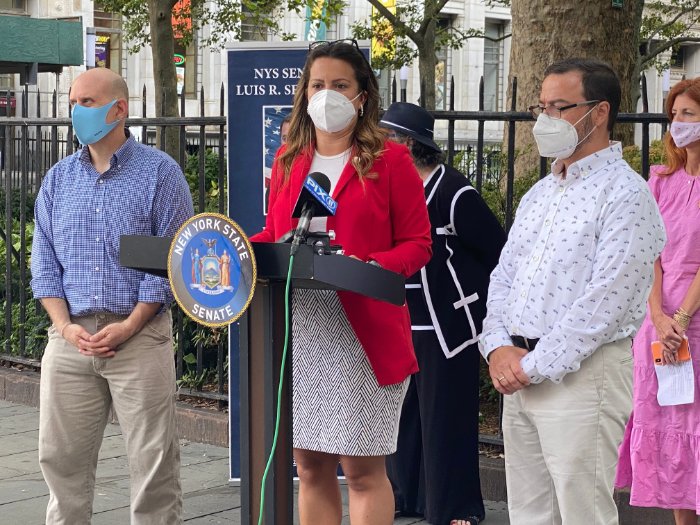
Assemblywoman Catalina Cruz (Courtesy of Assemblywoman Catalina Cruz’s Office)
Sept. 21, 2020 By Allie Griffin
A Jackson Heights State Assembly Member introduced legislation earlier this month that would create a system to track New Yorkers’ absentee ballots ahead of the November election.
Assemblywoman Catalina Cruz, whose district includes Jackson Heights, Corona and Elmhurst, introduced the bill Sept. 10 to increase voting transparency and security in absentee ballots across the state.
Cruz’ bill would establish a secure online portal that would allow voters to track the status of their absentee ballots, along with a mobile-based application.
Cruz — together with Bronx State Sen. Luis Sepúlveda — sponsored the legislation as more and more voters are planning to vote by mail this year over concerns of crowding and COVID-19 at poll sites.
The June primaries in New York saw a historic number of absentee ballots, which took several weeks for Board of Election officials to count and created more opportunities for technical flaws to invalidate votes. In New York City alone, more than 84,000 absentee ballots were tossed for such flaws as missing signatures or postmarks.
The legislation proposed would allow individuals to see whether the Board of Elections approved or rejected their ballot for the Nov. 3 general election.
“The fact that we continue to experience voter disenfranchisement in this day and age is outrageous,” Cruz said in a statement. “While the challenges of conducting an election during a public health crisis are understandable, the presence of widespread irregularities and incidents of voter suppression on Primary Day and in the counting of absentee ballots are extremely troubling.”
Thousands of New Yorkers didn’t receive their absentee ballots in the mail by Election Day in June as well.
“Voters must be assured that their vote counts and this bill is one step closer to ensuring this happens,” Cruz said. “I am proud to sponsor such an important bill that gives rights back to the voters.”
The New York City Board of Elections has already created a tracking system that allows voters to confirm if their absentee ballot application has been received, mailed out and accepted by the board.
BIG news! @BOENYC just released an Absentee Ballot Tracking system that confirms:
1) if they received your absentee ballot request
2) if they mailed your absentee ballot
3) if they accepted your absentee ballot, and how to fix it if they did not
Visit: https://t.co/cFG0JSuhv0
— NYC Votes (@NYCVotes) September 4, 2020
The legislation applies to absentee ballots throughout the state, where New Yorkers must request an absentee ballot by Oct. 27 in order to get one in the mail.
New York isn’t sending out ballots to those who do not request them, but eligible voters can submit an application for an absentee ballot due to COVID-19.
Cruz’s bill further aims to help the state economy as the Board of Elections would need to hire staff to develop, update and monitor the portal.






